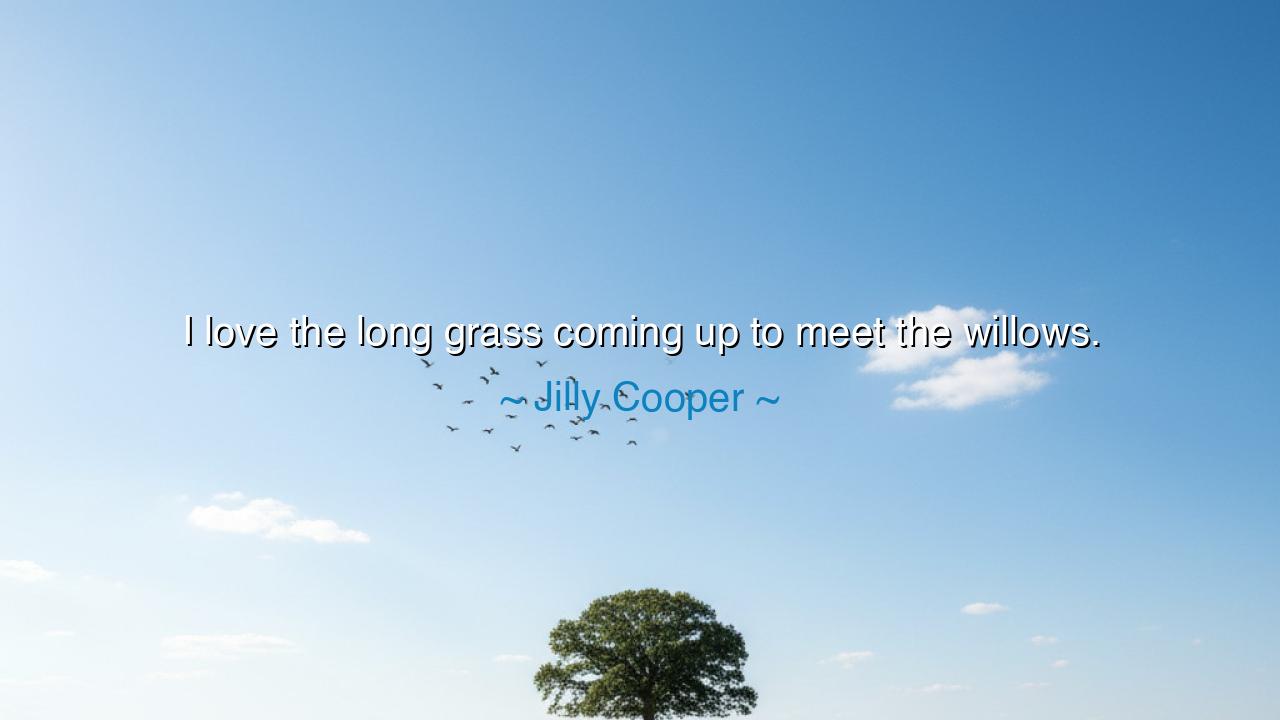
I love the long grass coming up to meet the willows.






The words of Jilly Cooper, “I love the long grass coming up to meet the willows,” are not a casual remark, but a hymn to the eternal embrace between earth and sky, between the restless surge of growth and the patient wisdom of trees. In these simple words lies a vision of harmony: the grass, humble yet unrelenting, rises to greet the willows, those ancient keepers who bow gracefully to the winds of time. It is the meeting of what is fleeting with what endures, the tender striving of youth against the backdrop of ageless guardianship.
The ancients would have heard in this saying not mere landscape, but symbol. The long grass speaks of life's abundance, of passions and desires untamed, always stretching upward, seeking light. The willows, bending yet unbroken, are emblems of resilience, sorrow, and grace. When these two meet, we are shown the unity of vigor and endurance, of restlessness and serenity. The heart that loves such a vision is a heart that understands balance, that rejoices in the marriage of growth and patience.
Consider the tale of the young Alexander, who once, as a boy, watched ivy creep upward toward the ancient plane trees of Macedonia. Where others saw only plants, he saw destiny — the climbing ivy was his ambition, forever reaching; the great tree was the world, firm and immovable. His conquests, though fierce and storm-born, were tempered by the wisdom of his tutor Aristotle, much like the long grass finding meaning in meeting the willows. Without the tree to lean upon, ivy grows wild and dies; without the rising ivy, the tree stands alone and solemn. So too must human striving learn to find its resting place in wisdom.
Yet there is also tenderness in this vision. The long grass whispers of childhood summers, of barefoot wanderings and quiet hours by riversides where the willows cast their shade. Who among us has not longed for such peace, when the burden of days seemed lighter and the world invited us to simply be? To love this image is to love simplicity, to treasure the fleeting beauty that dwells in ordinary places. It reminds us that the meeting of nature’s elements is a mirror of the human soul — restless yet yearning to find rest in something greater.
In another age, the Chinese poet Li Bai stood beneath the moonlight, his robes brushed by wild grasses while the willows swayed above the riverbanks. In his verses, he found kinship with these things: the grass reminded him of impermanence, of friendships parted and days lost; the willow’s bending grace spoke to him of endurance, of sorrow borne with dignity. Even in his drunken wanderings, he returned to such images, for they spoke truths deeper than wine — that beauty is born when fleeting growth and enduring wisdom meet.
The lesson, therefore, is this: let us not disdain the rising grass, nor overvalue the solemnity of the willows. Each alone is incomplete. To live fully is to allow our restless striving — our ambitions, our desires, our passions — to rise high, yet to meet them with patience, endurance, and grace. When the vigor of youth bows before the wisdom of age, and when the wisdom of age welcomes the energy of youth, then harmony is born, and the soul finds its dwelling place.
Practically, this teaching asks us to seek out both growth and balance in our lives. Let us cultivate ambition, daring to reach higher like the long grass toward the sun. But let us also root ourselves in humility and patience, like the willows by the river, whose strength lies not in rigidity but in bending with the storms. Spend time in nature; walk where the grass meets the trees, and learn from their silent counsel. In your daily struggles, strive — but also yield when it is wise to yield. In your relationships, let passion rise, but let patience receive it.
So, dear listener, remember this: to love the long grass coming up to meet the willows is to love the union of striving and serenity. It is to embrace both the fleeting and the eternal, and to walk in harmony with time itself. And in this love lies wisdom enough for a lifetime.






AAdministratorAdministrator
Welcome, honored guests. Please leave a comment, we will respond soon